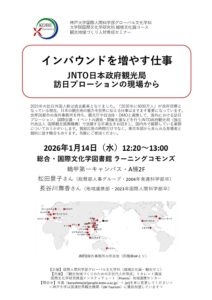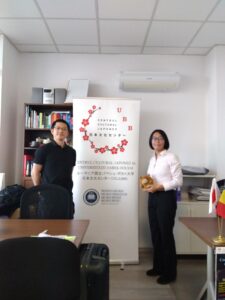Message from the Chief Director
It has long been said that the 21st century is the “century of globalization.” However, the progress of economic globalization does not, at the same time, necessarily mean a “rosy” future for societies and cultures. As of this writing, the war in Ukraine is still ongoing, with effects which are transcending national borders to cause ramifications worldwide. Furthermore, given the COVID-19 pandemic, which has adversely affected societies and cultures for more than two years, as well as the effects of climate change, along with others, if anything the “lights and shadows of globalization”—viz. the conflicts and contradictions of globalization together with its benefits—have become more conspicuous.
Today’s globalization is a complex composite phenomenon with a significant impact on every individual in the physical sense as well as on their lives, communities, societies, and nations, and even on transnational networks. It is thus not enough to tackle these ongoing problems through the perspective of “disciplines” as in the 20th century. Instead, all the humanities and social sciences must bring their respective wisdom to bear on the issues of the 21st century. In this sense, “Intercultural Studies” is one of approaches to developing collective knowledge of this kind. As a result of this, the Research Institute for Promoting Intercultural Studies at Kobe University aims to be a research center that responds to the global issues of the 21st century based on the work done so far.
The advanced reorganization of the Research Center for Promoting Intercultural Studies into the Research Institute for Promoting Intercultural Studies does not only mean an expansion in the scale of the organization, with the addition of the Center for Migration Research and the Center for Community Partnerships. It is, instead, based on the turning point reached in recent years by universities as well as the humanities and social sciences.
It is well known that modern universities in Japan, especially national universities, were strongly influenced by German universities from the 19th century on: the so-called “Humboldtian university” concept. However, this concept has also come under severe criticism in recent years. The Central Council for Education, for example, severely criticized the idea in a 2004 discussion as follows. “Surely the idea in which daigakujin [faculty members] define themselves primarily as researchers and consider the highest education to be the disclosure of their research outcomes is composed mainly with education for a minority elite in mind, retaining only historical significance in the 21st century of today.” Indeed, criticisms of the subdivision of research culture or its “octopus pot effect” (i.e., withdrawing from the outside world) have continued for 20 years. In response, national universities have undergone one reform after another, and perhaps due to the, so to speak, “reform fatigue” or the failure of the expected educational achievement of training highly skilled professionals, their research results are trending downward at this time.
In the humanities and social sciences, the fields and subjects of research are diverse, and graduate schools and faculties have been like “shopping arcades” full of independent shops for a long time. Although, as an independent researcher in spirit, each shopkeeper (that is, faculty member) has been sincere in their research and education, they are incapable of responding effectively to the “globalization” of universities or to the neoliberal efficiency and meritocracy that has crept into universities, resulting in some faculty members burdened with research, education and university administration. This problem has now come to the surface, as a “predicament” which can no longer be addressed at the individual faculty level.
The reorganization of the Research Center into the Research Institute intends to create a structure that will connect and support the achievements of researchers who have been working individually. Furthermore, the addition of the two Centers promises the overall utilization of the research strengths of the Graduate School. The presence of researchers, not only in the humanities and social sciences but also in the information sciences, is a great strength of our Graduate School. We have thus reorganized our Research Center into a Research Institute to carry out these objectives: to bridge the gap between individual research projects and to support the growth of new interdisciplinary research projects undertaken at the individual level and by the entire graduate school.
We hope to receive the support and assistance not only of the faculty members of our Graduate School, but also of the students and researchers both inside and outside the university, in the future enhancement and development of the Institute.
What is Promis?
The roots of the Research Institute for Promoting Intercultural Studies can be traced back to the Intercultural Research Center (IReC), which was established in July 2006. Since its inception in 1992, the Faculty of Intercultural Studies had been promoting education and research on intercultural issues, and research from a cultural perspective in a broader sense was being developed not only through the research results of individual faculty members but also through collaborative research in the form of projects. Based on this development, the IReC was established as an integrated research organization to further develop the characteristics of the Faculty of Intercultural Studies in both education and research.
The IReC, which started as a center affiliated with the Faculty of Intercultural Studies, was repositioned as a center affiliated with the Graduate School of Intercultural Studies in 2007. In the same year, "Regeneration of Urban Culture through Art Management Education" was adopted as a "Support Program for Contemporary Educational Needs (Contemporary GP)" and related projects were promoted.
In 2008, the IReC reorganized its Regional Collaboration Department into the Regional Collaboration Department for Arts Management and the Regional Collaboration Department for Multicultural Coexistence, and expanded its structure to four departments: the Research Department, the International Department, the Regional Collaboration Department for Arts Management (Cultural Policy Project), and the Regional Collaboration Department for Multicultural Conviviality (Regional Collaboration Project). The Department of Regional Collaboration for Multicultural Conviviality has been working on the Oxbridge English Summer Camp (since 2007) in collaboration with the Hyogo International Association, and has also expanded its projects to include collaboration with the Kobe Foreigners Friendship Center and Minami-Awaji City. In 2009, we concluded a comprehensive cooperation agreement with Minami-Awaji City.
In 2008, taking into account the significant changes in the media environment, the Center for Media and Cultural Studies (CMEC) was also established as an affiliate of the Graduate School of Intercultural Studies, to conduct multifaceted research on the dynamics of contemporary globalized culture. The two centers have continued to actively hold lectures and research seminars with domestic and international researchers. In 2011, the IReC signed a research cooperation agreement with the Office for the Promotion of University Collaboration of the Japan Aerospace Exploration Agency (JAXA), and further strengthened our collaboration with organizations outside the university.
In 2014, based on the past achievements and experiences of the IReC and CMEC, the Research Center for Promoting Intercultural Studies (Promis) was established as an intramural research organization of the Graduate School of Intercultural Studies, through integrating the two centers, to centralize financial and human resources and to utilize them more strategically. Promis has undergone several reforms and has been reorganized into five divisions: Research and Development, Inter-Organizational Networking, International Exchange, Migration Research, and Priority Research. Promis has developed and promoted various research projects in collaboration with domestic and international researchers. We have also focused on supporting the research of young researchers—research fellows and collaborative researchers.
In 2016, "Research on the Public Policies on Migration, Multiculturalization and Welfare for the Regeneration of Communities in European, Asian and Japanese Societies" was selected by the Japan Society for the Promotion of Science (JSPS) as a "Core-to-Core Program (A. Advanced Research Networks)." Promis has been playing a central role in the implementation of this project and has been working on the construction of a research center for migration, multiculturalism, and welfare policy in collaboration with eight overseas universities, four domestic universities and one research institute, and other graduate schools within Kobe University.
We have also expanded our efforts in community partnerships, deepening our ties with organizations outside the university that support community cultures, such as the Kobe Planet Film Archive and the Awaji Puppet Theater. In 2017, the Faculty of Intercultural Studies was merged with the Faculty of Human Development to form the Faculty of Global Human Sciences, and in response, Promis has expanded its efforts to include new themes for the Graduate School of Intercultural Studies such as tourism and urban planning.
Based on the development of these efforts, the Research Center for Promoting Intercultural Studies is reorganized into the Research Institute for Promoting Intercultural Studies (Promis) in April 2022. Under this new institute, the Center of Migration Research and the Center for Community Partnerships are established, and the three core divisions of Research and Development, International Cooperation and Networking, and Priority Research are also established. With this new integrated organization, the Research Institute for the Promotion of Intercultural Studies will continue to work as a research platform for the Graduate School of Intercultural Studies to further its future endeavors.
Our symbol mark

While the logo mark is an acronym formed from the initial letters of the official name of our organization,
the symbol mark represents our aspirations.
In April 2022, the Research Center for Promoting Intercultural Studies was reorganized into the Research Institute for Promoting Intercultural Studies as a research platform with two research centers and three core departments. Retaining the abbreviation ‘Promis’ for our Research Institute, we renew our willingness to push forward the philosophy and identity we have cultivated and created, regardless of this reorganization. On this occasion of the reorganization and renewal, we have decided to settle on a symbol mark to signify our philosophy and identity in a manner which is concise and straightforward to any individual. Taking that into account, we requested Daisuke Satō, a rising art director and graphic designer, to design our symbol mark that eventually appeared on 21 June 2022.
In this symbol mark, the initial letter P of Promis is depicted as speech balloons, and two of these are interlocked upside-down. These two speech balloons symbolize the image of dialogues between different groups of people. Notwithstanding that the dialogues do not always lead to compromise, we aspire to persevere in our persistent efforts to explore the possibilities of dialogues. Thus, we also put such aspirations into this symbol mark.
Organization
Center of Migration Research
Center for Community Partnerships
Divisions
Research and Development Division
The Research and Development Division focuses on promoting research development for intercultural studies and joint research projects, as well as duties related to planning and hosting large symposiums at which research project results are announced.
International Cooperation and Networking Division
The International Cooperation and Networking Division focuses on sending and inviting scholars while collaborating with overseas research institutions, planning and hosting lectures and special courses led by invited scholars from partner universities, and hosting foreign researchers.
Priority Research Division
The Priority Research Division focuses on the promotion of research projects related to intercultural studies, with special priority given to those projects.




